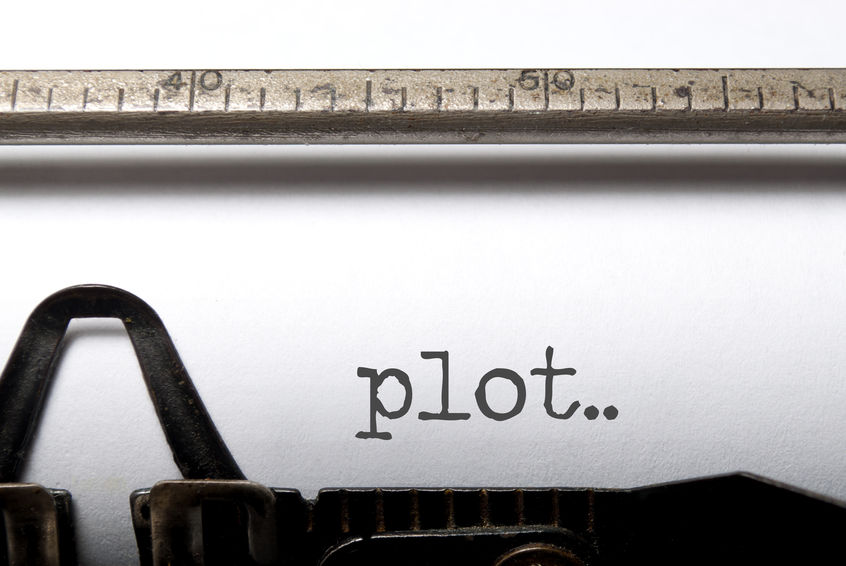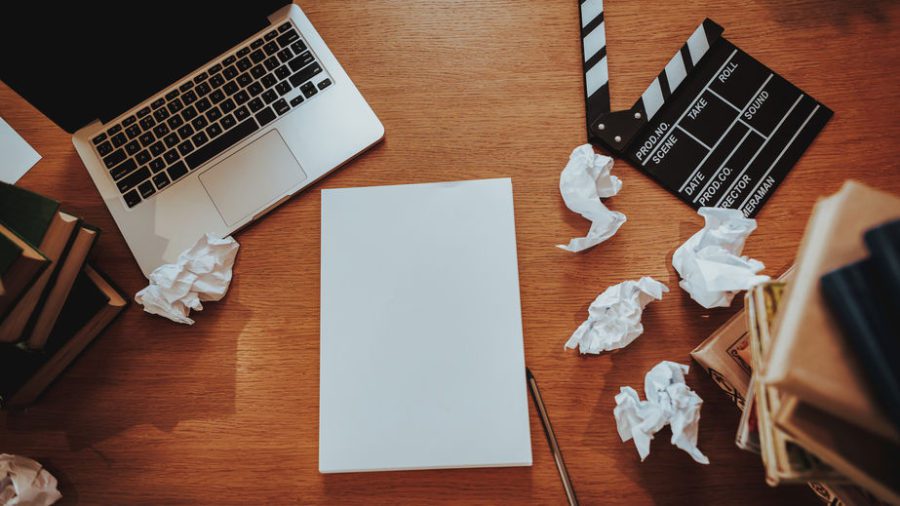DISCLOSURE: AS AN AMAZON ASSOCIATE I EARN FROM QUALIFYING PURCHASES. READ THE FULL DISCLOSURE FOR MORE INFO. ALL AFFILIATE LINKS ARE MARKED #ad
You might have a good idea for a premise for your story, but how to come up with the plot?
Coming up with good plot ideas requires two things: a working knowledge of story structure and the ability to develop creative twists via brainstorming.
If you’re good at brainstorming new ideas, your issue might be in structuring your story, which we’ll cover.
If you know how story structure works and instead struggle with fresh ways to plot things out, read ahead for some brainstorming tips effectively.
As you can see, coming up with plot ideas for your next film is a little more complicated than a simple step by step process. Let’s dive in!
What are plot ideas?

When we say “plot ideas,” we are talking about plot points, also known as story beats, which are the key moments or scenes in your story that inform your character’s change over time.
If you are looking for how to come up with story ideas, as in concepts, that’s a different topic entirely, but we do cover brainstorming and how you could use it to help with that further down in the article.
Back to plot points. Think of the arc of your story like a road trip. Your character is driving the car, their ultimate destination is their life-change, and the plot points are the stops along the way that get them there. In that sense, plot points are the driving engine moving your story forward.
Because plot points are the key moments that affect your character’s journey, plot points are really all about conflicts the characters face and if those conflicts are resolved or expanded.
It would be like if every time you stopped along your trip, you faced a challenge, like a flat tire, that you had to solve before you could keep going.
For any good story to have good plot points, the audience needs to be constantly asking, “what happens next?”
Overcoming all those challenges would inevitably change you. You’d become more confident. Or maybe less cocky. Or more understanding. Or more patient. Or kind to others. Or world-weary – not all changes are good!
For any good story to have good plot points, the audience needs to be constantly asking, “what happens next?”
The best answer is to answer with another question. Every time a plot idea is resolved, another pops up. What happens next becomes what now?
Why am I struggling to come up with good plot ideas?

When you are struggling with coming up with good plot ideas for your film, there could be a few different reasons why.
The first step is self-diagnosing: what is holding you back from knowing how you want to plot out your story. Is it a temporary setback or a full-on writer’s block?
As we’ve covered before, there are a million and one reasons why you might be struggling with the writer’s block stopping up your plot.
Here are a few common answers:
- Do you mostly know how you want your story to go but can’t get started?
- Then you might have a great idea but don’t know how you want to execute it.
- Did you write 30 pages in and then got stuck?
- Then you might not have thought through your whole story, in which case you might need to finish outlining your story structure.
In both cases, you can come up with good plot ideas by outlining your story. This requires a working knowledge and implementation of classic narrative story structure.
- Do you know your whole story down to the last beat but can’t figure out how to write a specific scene?
- It could be you need to finish thinking through all your options, in which case a jolt of creativity to make the scene feel more original and less cliche could be what you need.
Let’s focus on that last one. You might find you never have a problem with “what” to write. But when you sit down to write it, you still get stuck. Why? It’s the how that’s the issue.
Whenever you start a scene with a clear idea of how it will go, the writing feels like a breeze. Meanwhile, when you don’t have as clear an image, it can feel like a total slog.
In this case, you will need to brainstorm some creative solutions to come up with better plot ideas for the specific scene you are struggling with.
Let’s review how to do both below!
How do I use story structure to come up with good plot ideas?

When you are struggling with good plot ideas, you can use story structure to inform what should happen next. All film storytelling follows a similar narrative trajectory, or structure, that acts as the bones holding the story together.
By following the traditional Hollywood arc, you should be able to design scenes that fit neatly into the notches on the arc. If you write out all the scenes as they happen to you naturally and then get stuck, refer back to the arc for a broad level idea of where your story should be going.
To better help with that process, we have written a lot about how to write a story that works, so check that article out first.
For good plot points, your characters need to want something (goal) they can’t get due to an obstacle (conflict).
Basically, it all comes down to this simple concept: for good plot points, your characters need to want something (goal) they can’t get due to an obstacle (conflict).
From there, it’s all about keeping it interesting for the audience.
Those obstacles can be other people (character vs character); they can be larger structures and systems (character vs nature); or they can be an internal struggle (character vs themselves).
To make a compelling story full of good plot ideas, your character should have an external want as well as an internal need. The best stories have a conflict between what the character wants vs. what the character needs.
So whenever you’re stuck, start by asking yourself these three questions:
At this point in the story…
- … what does my character want?
- … what does my character need?
- … what’s keeping my character from getting it?
Why do external wants and internal needs make for a good plot?

Even while all stories tend to follow the traditional arc as outlined in the other articles, I’ve linked to, you don’t want every movie to feel just like every other movie, or for the plot to happen the exact same way.
This is why an internal battle conflicting with external goals is vital for good plotting.
If all you needed were a hero saving the day, the story would be boring. They just have to overcome the obstacles in front of them and best the bad guy, right?
But what if the hero doesn’t want to save the day? What if he refuses the call? Their need is to save the day, but their want is to chill at home unscathed.
Now you have a conflict that reaches deeper. It’s not just a story of good vs. evil, but of humanity and morality and ethics.
Do we have an ethical responsibility to act when called upon by an important cause? Is it morally irresponsible to do nothing, even when you know doing so is wrong?
I’m talking about baking a central dramatic question into your plot to make it more compelling. Something intriguing to you as a writer as well as the audience.
Can lovers be friends? Can friends be enemies, then turn back into friends? Who did it, and why? Were they always destined to do it, or did they make some fatal mistake along the way?
Central dramatic questions are the root of all good drama. They are the exploratory vessel plunging the depths of the human condition in order to try to make some new discovery.
It should be a question you yourself want to be answered through writing this story, and if you make it compelling enough, you can make other people want the answers too.
How does asking a central dramatic question make my plot ideas better?

This question is best answered with an example. Let’s say you want to answer the central dramatic question: what is the price of fame? So you set out to answer this question with the story of a struggling musician trying to make it in Nashville.
The traditional arc would dictate they get a version of success by the film’s midpoint, lose a part of themselves in the process, including some close friends, by the film’s lowest moment, then make things right with said friends before the grand finale, where they play the big concert having changed.
But what if your story of a struggling musician played out differently?
What if, instead of losing friends along the way, your character was the friend who was lost. Who had to watch while their friend achieved success and fame? What if their internal struggle was about accepting their own lack of success and overcoming their jealousy of their friend?
How could this conflict play with the traditional plot arc of an A Star Is Born style story and flip it on its head?
You could create some great scenes that show another perspective to the classic success story, each asking the central question of “what’s the price of fame?”
By using each scene as an opportunity to answer your central dramatic question, each scene becomes rich with potential plot ideas for how to both answer and not answer questions.
Also, notice how I used a classical story trope to base my own plot on? You can also use classical story tropes to create good plot ideas.
How do I use classic story tropes for good plot ideas?
Classical story tropes can be useful starting points for coming up with good plot ideas, so think about your favorite genres, or even certain films of that genre, and try to break down the plot points of their movies as a type of bone structure to plot your own story.
For instance, think about the trope of the adventure film. A character travels to a new world on a quest for some goal, learns about it while experiencing a series of trials and tribulations, and overcomes those obstacles before returning home.
That structure is easily applied to Lord of the Rings, Star Wars, Indiana Jones, or any other classic adventure series because it has its roots in classic storytelling.
Breaking that down further: what if you lifted the exact plot from one of the movies mentioned above as a template for your own story?
For instance, what if you took the story from The Empire Strikes Back and used it as a basis for your own plot?
You start by plunging your heroes into the middle of a conflict, like the snow-fight on Hoth.
The conflict goes from bad to worse, and now your heroes are separated and on the run. One goes to seek the wisdom of a Wiseman… (don’t fall asleep!)
While the others seek refuge elsewhere, only to be betrayed by a supposed friend…
Finally, they all reconvene together for a final battle, using what they’ve learned to face their demons…
Win or lose, they finally realize their strength comes from working together.
Taking the “Empire” and any non-structural story similarities out of the equation, following the above plot beats for your next film is a great starting point to generate good plot ideas. Take the story you are working on and see if you can fit your plot points into a similar structure.
Your favorite screenwriters and directors remix classic film structures too
Remixing your favorite films’ structures is a great tool for plotting your own stories out as your idols do. Don’t take my word for it – George Lucas did the same thing by borrowing from the classic film Casablanca’s structure to create the original Star Wars Trilogy.
Think about it: a cantina oasis (Rick Blaine’s Rick’s Café Américain in Casablanca) on the desert planet Mos Eisley is the perfect transplant for the Morrocan city of Casablanca.
Mos Eisley is patrolled not by nazis but imperial soldiers working for an evil empire (Nazi Germany during World War II).
Han Solo is inspired by Rick (Humphrey Bogart) in Casablanca and convinces him to help fight for the underdogs against all odds.
Jabba the Hutt was inspired by Signor Ferrari (Sydney Greenstreet) in Casablanca, and there might exist early sketches of Jabba featured with a Fez in private collections though this isn’t confirmed.
Now, George’s story continues onward, where Casablanca ends. Still, you can easily spot the structural similarities between it and the first half of Star Wars.
And that’s not even getting into all the inspirations Lucas borrowed from Akira Kurosawa and his samurai films like Yojimbo.
Stand on the shoulders of giants
Think of your favorite movies. How do they plot their story? How can you use those plot beats as structural bones to build your own story?
And most importantly, how can you add to where they left off or remix what they did to build your own original story?
Once you have a structure to build your story off of, start writing it out in an outline or treatment style document before you begin writing. For more on treatments and how to write them, check out our piece on how to write treatments.
Now, what if your issue is less about story structure than it is about execution? Better brainstorming is what you need to do!
How do I get better at brainstorming plot ideas?

Simply put: you can get better at brainstorming by rethinking how you brainstorm, and there are a few different methods to do so.
Most people think brainstorming is all about writing a bunch of loosely related ideas on a blank piece of paper and trying to connect them.
This can feel like banging your head against a wall, especially the longer you sit there with no new ideas flooding towards you.
Instead, try one of these quick and easy to implement brainstorming tricks next time you get stuck on a scene (Note – they are not in any particular order, but I do recommend trying them all in succession the next time you get to a stopping point on your story):
- Work out. Brainstorming is all about getting synapses to fire in your mind. You need to see the scene to write the scene. Working out (even to music) can help get your brain thinking in new ways and help you visualize the scene you’re trying to write.
- Take a walk or take a drive. Same as working out, taking a walk or a drive, particularly in an area you are unfamiliar with, can help spark new synapses in your brain and help activate your creative mind. I enjoy listening to music to help inspire.
- Write the bad version. Just try writing the scene. You know what needs to happen; you’re just worried you’re going to write it wrong, so write it wrong.
You can always fix it once you have it written out. You might even accidentally write something good – even if it’s just one line! Just keep in mind rewriting will probably be required.
- Write ten different ways the scene could go. Start with the most obvious way, and end with the most insane.
You probably shouldn’t go with number ten, and you definitely shouldn’t go with number one, so hopefully, somewhere between 4 and 8, you’ll discover an interesting way to write the scene.
- Treat your script as a diary. Writing is very therapeutic, so if you’re struggling to write a scene, it could be because you aren’t connecting with it.
If something else is taking up your creative/mental energy, try to write a completely unrelated scene featuring characters or ideas from your own life that you need to work through, and write that instead. It could lead to a breakthrough – of one kind or another!
- Watch a new movie – or a bad one. The point is, don’t watch one of your favorites. You’re going to get discouraged by the talent behind the stuff you love.
Watch something new or something bad instead. Preferably something bad, but with a concept that sounds interesting. How would you have written it differently? What makes it bad?
- Switch projects. You might be hitting your head against a wall on this current project, so why not try to write one of your other ideas?
Even if you end up hitting your head against the wall over that script, it could lead to a new idea for this one, which is what you were trying to do anyway.
- Switch genres. If this scene were taking place in another genre, how would the scene go down?
Would the lead sweep the villain up into a sweet embrace, or would the calvary burst down the door guns blazing?
Would a painting mysteriously fall off the wall, or would the ghost surprise everyone with a spell of stage fright during their big reveal?
- Imagine filming the scene in question. If you were the director on set, what would you need to know to film the scene?
Imagine the space, imagine the actors, imagine the props and the action all taking place. Step it out moment by moment, shot by shot even.
You might not be the director of the final product, but you’re the director of the film in your head, so direct away. It’s your first draft, after all. You can always edit it down later.
- Imagine a different point of view. The point of view of the scene is important for how you conceptualize it.
If a spouse is walking in on their significant other in the arms of a lover, that’s a very different point of view than the lover finding themselves caught in the act.
If you’re struggling with how to write a scene, try switching character point of views.
- Imagine watching this movie. Lastly, try thinking about what you’d want to see. What would be fun to watch? What’s the most fun way to convey the information you need to share?
Start as close to the action as you can, and end at the most interesting moment. If you can end the scene before a critical question is answered, you’ve hooked the audience for at least another scene.
Keep this going throughout, and you have a movie!
Use music to inspire you
In addition to the above, I always recommend making playlists with music that inspire you to go along with whatever scene, genre, or story you are writing.
Music helps me focus, and the right song hitting at the right time can feel like a divine intervention – all of a sudden, I know exactly how the scene needs to go, down to the exact timing of the chorus hitting right when the action kicks into gear.
Further Reading
Finally, if none of these brainstorming tips help you, you might just be struggling with how to write a scene in general.
For more on that, I defer to the expert, John August! Check out his article on his personal blog about how to write a scene to help you get started.
If you’ve got any great tips or comments, let’s know in the comment section below.


U are such an amazing!blogger, keep it up ❤️❤️❤️